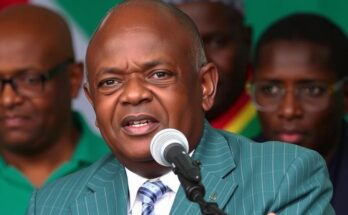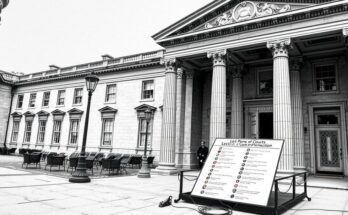Yamandú Orsi of the Broad Front won Uruguay’s presidential election, defeating Álvaro Delgado of the ruling coalition with just over 49% of the vote. The election signals widespread discontent with the incumbent government amid economic stagnation and rising crime. Orsi, a moderate, aims to unite the nation and implement policies to tackle poverty and stimulate growth, continuing the Broad Front’s legacy of social reform.
On Sunday, February 11, 2024, Uruguay’s leftist candidate Yamandú Orsi emerged victorious in a closely contested presidential runoff, effectively unseating the conservative governing coalition. As the results became clearer, Álvaro Delgado, the candidate of the ruling center-right coalition, acknowledged his defeat, stating, “With sadness, but without guilt, we can congratulate the winner.” Orsi, a former history teacher and mayor, celebrated with supporters, proclaiming a commitment to national unity amidst the divided sentiments within the nation.
Orsi secured just over 49% of the votes against Delgado’s 46%, demonstrating the electorate’s discontent with the current administration, which has been flagged by issues such as economic stagnation and rising crime rates. Despite this favorable outcome for the opposition, Orsi has positioned himself as a moderate leader with no drastic plans for transformation, attempting to connect with voters across the spectrum. His campaign emphasized a blend of market-friendly policies and reforms that resonate with the Broad Front’s previous governance, which earned accolades for fostering economic growth and enacting progressive social legislation.
With a voter turnout approaching 90%, the electoral mood reflected broader discontent seen in other global elections. Orsi plans to implement tax incentives to boost investment in agriculture and reform social security, though he appears to steer clear of any radical measures. His victory has been interpreted as a rejection of the incumbent’s pro-business approach, which was symbolic of the dissatisfaction amid ongoing economic challenges.
In the days following the election, Orsi is expected to engage in discussions aimed at fostering nationwide dialogue and cooperation among varying political perspectives. He expressed in his victory speech, “I will be the President who calls for national dialogue again and again, who builds a more integrated society and country,” indicating his readiness to confront the challenges ahead collaboratively. His administration is set to assume office on March 1, 2025, aiming to address the pressing issues of poverty, crime, and economic revitalization in Uruguay.
The recent presidential election in Uruguay reflects a significant political shift within the nation, as Yamandú Orsi from the leftist Broad Front coalition has taken over power from the conservative ruling coalition led by Álvaro Delgado. This election marks a notable trend throughout 2024, wherein voters globally have expressed dissatisfaction with existing governments, resulting in a preference for anti-incumbent candidates. Orsi’s leadership is particularly significant as it raises questions about the future direction of economic policies and social reforms in a country celebrated for its progressive legislation over the past two decades. The historical context includes the Broad Front’s governance from 2005 to 2020, characterized by responsible economic management and social advancements. Orsi’s platform appears to continue the foundational elements established by previous administrations while responding to the urgent needs of the current electorate. The electoral process was influenced by a general sentiment of frustration due to stagnant wages and increasing concerns over crime, which have shaped the perceptions of the ruling party’s effectiveness. Orsi’s leadership will commence in a context where both domestic and international influences are pressing on Uruguay’s political and economic stability, setting the stage for critical developments in the coming years.
Yamandú Orsi’s election as the President of Uruguay marks a pivotal change in the country’s political landscape, reflecting a national desire for renewal in response to economic and social challenges. As a moderate figure, Orsi aims to lead by fostering cooperation and addressing issues of poverty and insecurity, capitalizing on the Broad Front’s historical successes while promising stability. His upcoming administration presents an opportunity for dialogue and potential reforms, as he seeks to unify a divided populace in pursuit of a prosperous future for all Uruguayans.
Original Source: time.com




